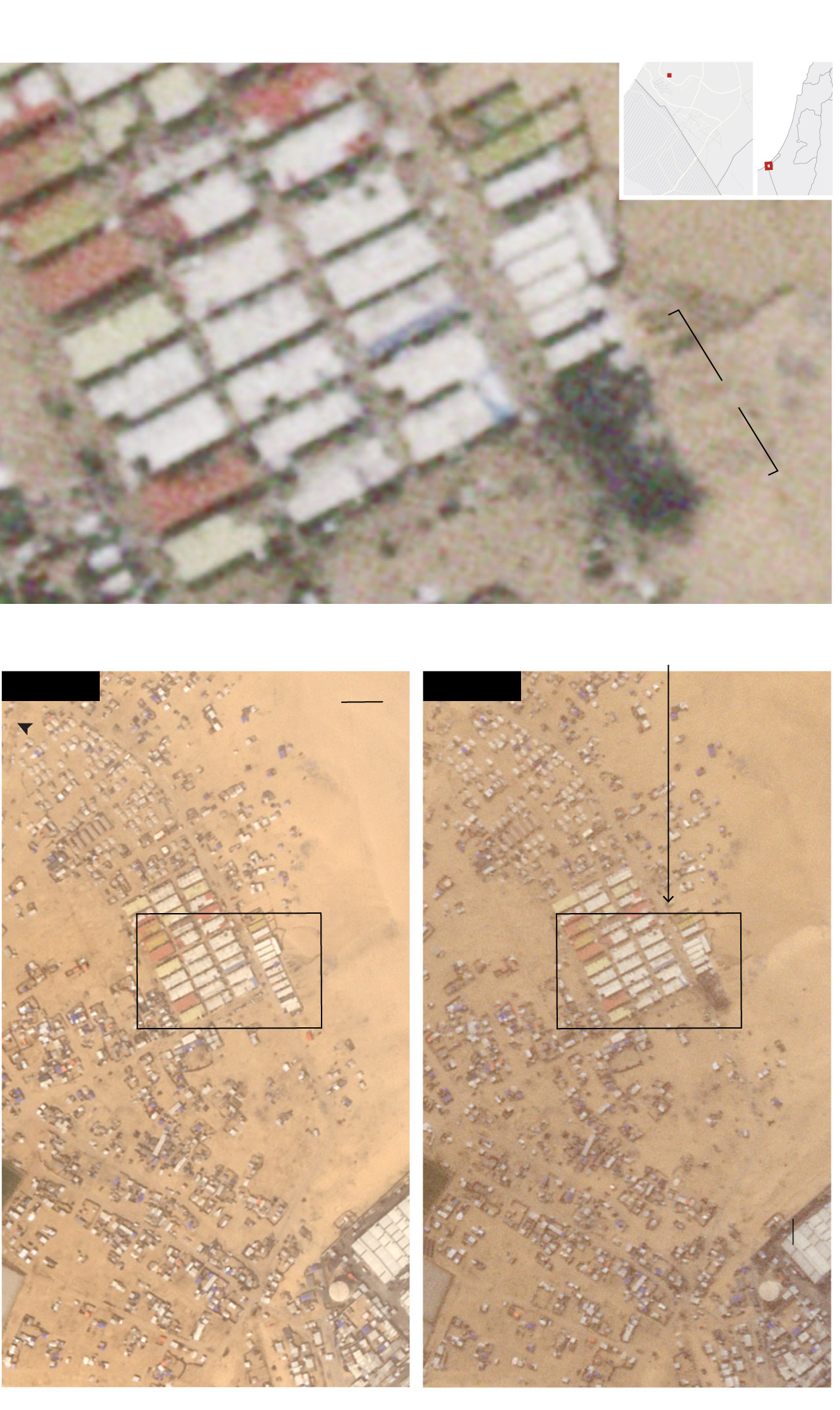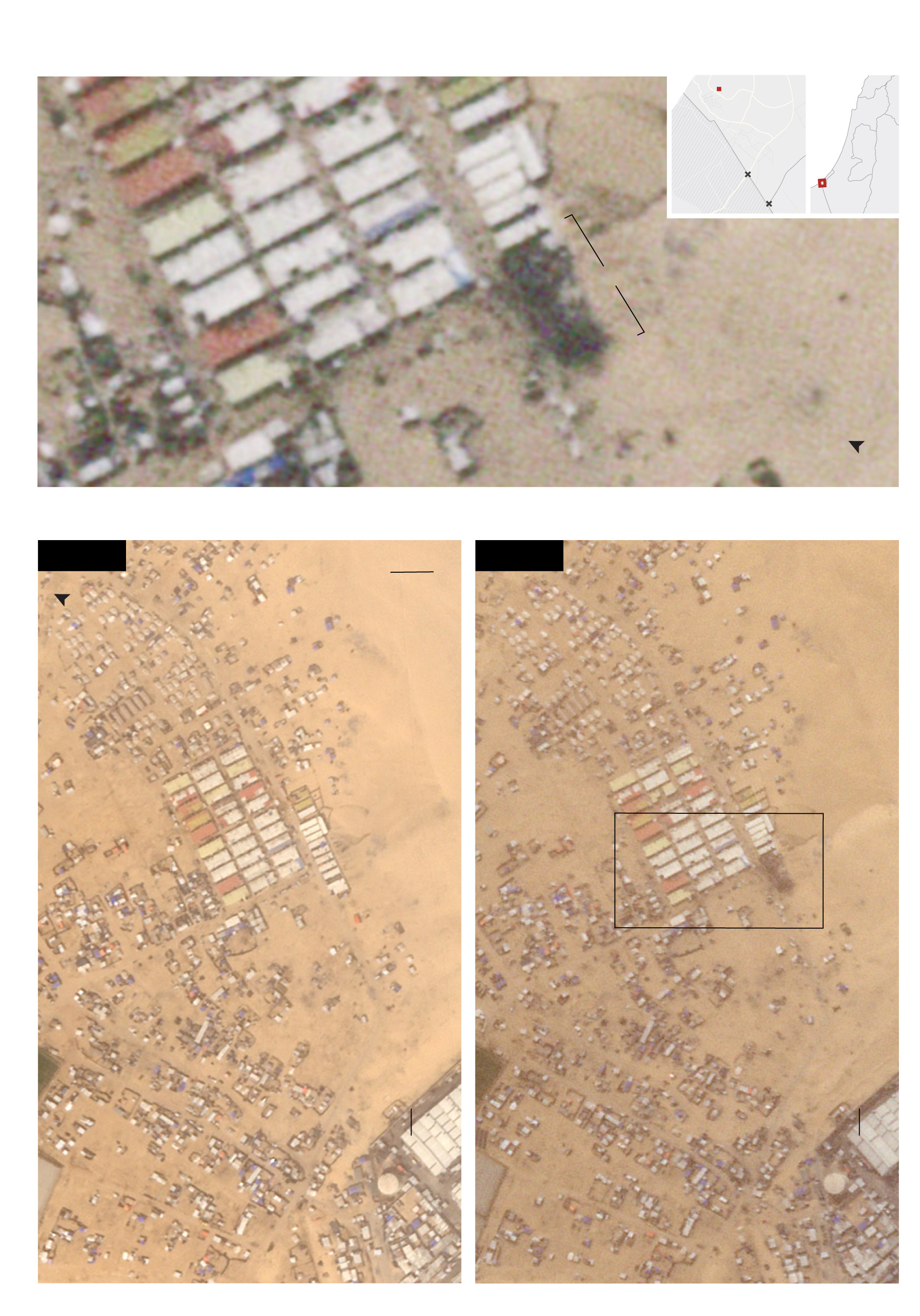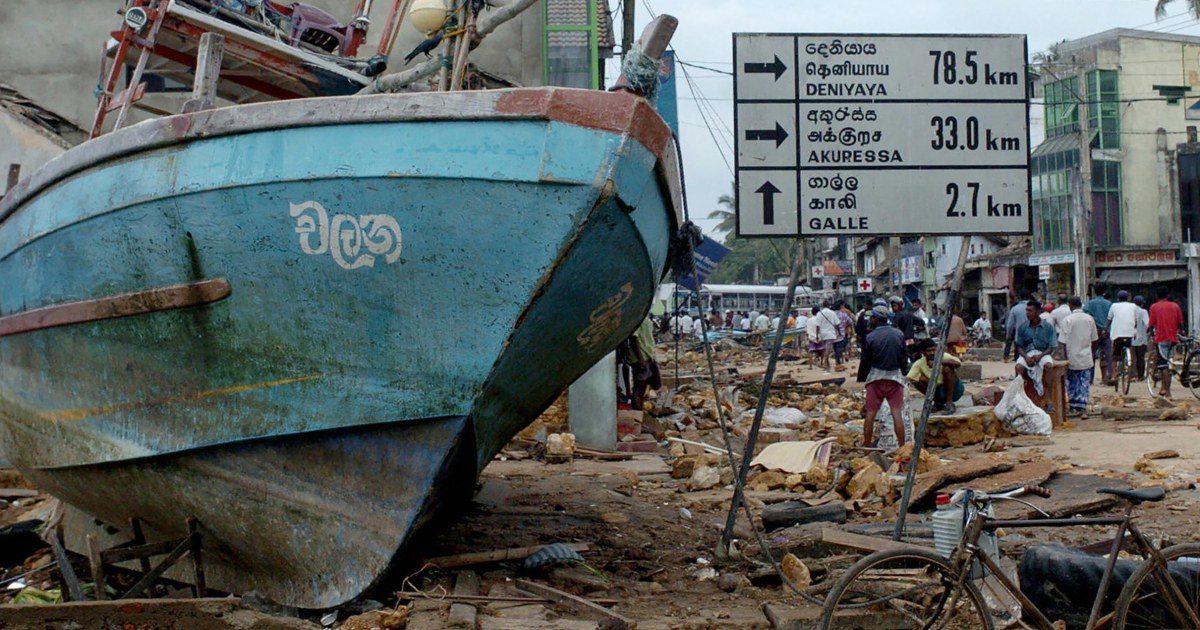At least 21 people were killed in a tent encampment near Rafah’s coast Tuesday on Tuesday by what a spokesman for Gaza’s civil defense said was likely Israeli artillery fire.
World
21 people killed in new Rafah strike, say Gaza officials

The Israel Defense Forces, in a statement Tuesday, said it “did not strike in the humanitarian area in al-Mawasi,” referring to a zone along Gaza’s coast. Witnesses said the strikes occurred just south of the humanitarian zone.
Several witnesses described hearing explosions around 2:30 p.m. local time. Nidal Wahba, 58, said the first occurred when he was sitting in his house, around 200 yards from the site of the first strike. As he left to investigate, a second explosion struck a tent belonging to the al-Absi family, where he saw dozens of casualties and “bodies thrown everywhere.” As he tried to help the victims, he was shocked to find his 38-year old daughter, Reham, among them, covered in blood with a head injury.
He took Reham to one hospital, run by the International Medical Corps, and they were redirected to the European Hospital, where there were a “frightening number of victims everywhere,” he said. Wahba said he believed the explosions were caused by artillery fire, rather than airstrikes, because of the shallow depth of the craters left behind.
GET CAUGHT UP
Summarized stories to quickly stay informed
Ahmed al-Taweel, 30, another witness, said he was with his daughter, trying to get water from a truck when the first shell struck, about 20 yards from where they stood. The strikes landed on tents a few yards away from his family’s tent, he said. Among the victims was his cousin, Sahar al-Taweel, 35, who was not expected to survive, he added. Another cousin, also named Ahmed, 13, was among those killed, he said.
Osama al-Bayouk, 37, said in a phone interview that two of his daughters were injured in the strikes — one of them, Leah, 14, was critically injured, he told The Post. “I cannot describe what I saw, dozens of martyrs, blood everywhere, people slaughtered,” he said, as he sat with Leah in the intensive care unit of the IMC hospital.
Gaza’s civil defense crews in Rafah were subjected to three attacks since midnight Tuesday while carrying out their job, the agency said in a statement, adding that bomber planes fired on crews and that snipers targeted crew members and an ambulance west of Rafah. Artillery shells were also fired at civil defense members, accompanied by the Palestinian Red Crescent, while trying to retrieve injured people near the Zoroub roundabout, the ministry said.
The IDF did not immediately respond to a request for comment on these reports but said in a statement Tuesday that it was continuing operations in Rafah, including in the Philadelphi Corridor area, as well as in Jabalya, northern Gaza and central Gaza.
An Israeli military investigation into a previous deadly strike at a tent camp in Rafah this past weekend — which killed 45 and drew worldwide condemnation — suggested that a secondary explosion started a blaze that led to many of the deaths, an official said Tuesday.
The attack, which took place Sunday, targeted two senior Hamas militants and used “the smallest munition that our jets can use,” described as 37 pounds in weight, Israeli military spokesman Daniel Hagari told reporters.
“Our munition alone could not have ignited a fire of this size,” he said. He added that the ongoing investigation is looking into the possibility that “secondary explosions” linked to “weapons stored in a compound next to our target” may have ignited the deadly blaze.
Hagari added that the Israel Defense Forces took “a number of steps prior to the strike to avoid civilian casualties,” including aerial surveillance. He called the fire “unexpected and unintended” and expressed “deep sorrow for this tragic loss of life.”
“Our war is against Hamas, not against the people of Gaza,” he said.
Israeli forces seized control of the Rafah border crossing in early May, shutting off the flow of aid through the crucial passage and forcing hundreds of thousands of civilians to flee. Israel has since expanded its ground incursion and intensified its bombardment of the area, despite assurances given to the United States of an “operation of limited scope, scale and duration,” National Security Council spokesman John Kirby said at the time.
Tal al-Sultan tent camp after
and before IDF’s strike
Makeshift accommodation
(visible in satellite from early January)
SAMUEL GRANADOS / THE WASHINGTON POST

Tal al-Sultan tent camp after
and before IDF’s strike
Makeshift accommodation
(visible in satellite from early January)
SAMUEL GRANADOS / THE WASHINGTON POST

Makeshift accommodation
(visible in satellite from early January)
Before and after IDF’s strike
SAMUEL GRANADOS / THE WASHINGTON POST

Makeshift accommodation
(visible in satellite from early January)
Before and after IDF’s strike
SAMUEL GRANADOS / THE WASHINGTON POST
Israeli Prime Minister Benjamin Netanyahu on Monday called the Sunday night strike on Rafah a “tragic accident,” a departure from public Israeli military statements that referred to the strike as “intelligence-based.” But the acknowledgment did little to quell international outrage over the attack.
More than a dozen international aid agencies, among them Oxfam and the Norwegian Refugee Council, signed a joint letter calling on all members of the U.N. Security Council to enforce an order last Friday by the International Court of Justice for Israel to halt its military operations in Rafah.
Despite the legal order, the letter said, “the bloodshed has continued.” A failure by the UNSC to act “would undermine global trust in the primacy of international law,” the letter added.
Nearly 1 million people have fled Rafah in the past three weeks, the U.N. Relief and Works Agency (UNRWA) that aids Palestinian refugees reported, with that number expected to rise after the weekend’s strike. UNRWA tweeted Tuesday that there was “nowhere safe to go & amidst bombardments, lack of food & water, piles of waste & unsuitable living conditions” in Rafah. “Day after day, providing assistance & protection becomes nearly impossible,” it continued. The agency called for an immediate cease-fire.
Spain, Ireland and Norway formally recognized Palestine as a state on Tuesday, a week after they announced their intentions to do so. “The Government recognises Palestine as a sovereign and independent state and agreed to establish full diplomatic relations between Dublin and Ramallah,” Ireland’s government said in a statement, noting the “tragic backdrop to today’s announcement.” Norway said the recognition “represents a milestone in Norwegian-Palestinian relations.” Spanish Prime Minister Pedro Sánchez called it a “matter of historical justice” and necessary to “achieve peace.” Officials in Israel have criticized the decisions.
The United Nations Security Council will meet Tuesday to “discuss the situation in Rafah,” according to British representatives to the United Nations. The meeting will be a “closed session,” they said, and therefore not open to press. Hamas in a statement Tuesday said the “the international community and the Security Council must act urgently and take a clear decision to stop these flagrant violations of international laws.”
Egypt is investigating a shooting incident in the Rafah border area that killed a member of its security forces Monday. Israel confirmed a shooting and said it was also investigating. A former Egyptian official told The Washington Post on Monday that details of the incident could be outlined by a joint committee Tuesday.
At least 36,096 people have been killed and 81,136 injured in Gaza since the war started, said the Gaza Health Ministry, which does not distinguish between civilians and combatants but says the majority of the dead are women and children. Israel estimates about 1,200 people were killed in Hamas’s Oct. 7 attack, including more than 300 soldiers, and it says 287 soldiers have been killed since the launch of its military operations in Gaza.
Heba Farouk Mahfouz and Lior Soroka contributed to this report.










